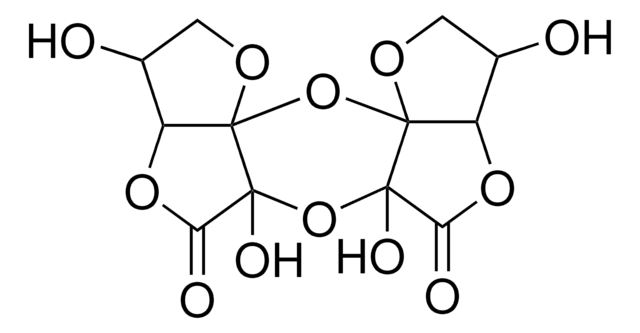856061
D-(−)-Isoascorbic acid
98%
Sinónimos:
D-erythro-Hex-2-enoic acid γ-lactone, D-Araboascorbic acid, Erythorbic acid, Glucosaccharonic acid, NSC 8117
About This Item
Productos recomendados
Nivel de calidad
Análisis
98%
formulario
crystals
actividad óptica
[α]25/D −16.8°, c = 2 in H2O
mp
169-172 °C (dec.) (lit.)
cadena SMILES
[H][C@@]1(OC(=O)C(O)=C1O)[C@H](O)CO
InChI
1S/C6H8O6/c7-1-2(8)5-3(9)4(10)6(11)12-5/h2,5,7-10H,1H2/t2-,5-/m1/s1
Clave InChI
CIWBSHSKHKDKBQ-DUZGATOHSA-N
¿Está buscando productos similares? Visita Guía de comparación de productos
Descripción general
Aplicación
- enantiopure aminotriol
- (3R, 4S)-4-hydroxylasiodiplodin and D-mycinose
- enantiomerically pure stereoisomers of α,β-dihydroxy-aldehydes or acids
Código de clase de almacenamiento
11 - Combustible Solids
Clase de riesgo para el agua (WGK)
WGK 2
Equipo de protección personal
dust mask type N95 (US), Eyeshields, Gloves
Elija entre una de las versiones más recientes:
¿Ya tiene este producto?
Encuentre la documentación para los productos que ha comprado recientemente en la Biblioteca de documentos.
Los clientes también vieron
Nuestro equipo de científicos tiene experiencia en todas las áreas de investigación: Ciencias de la vida, Ciencia de los materiales, Síntesis química, Cromatografía, Analítica y muchas otras.
Póngase en contacto con el Servicio técnico
